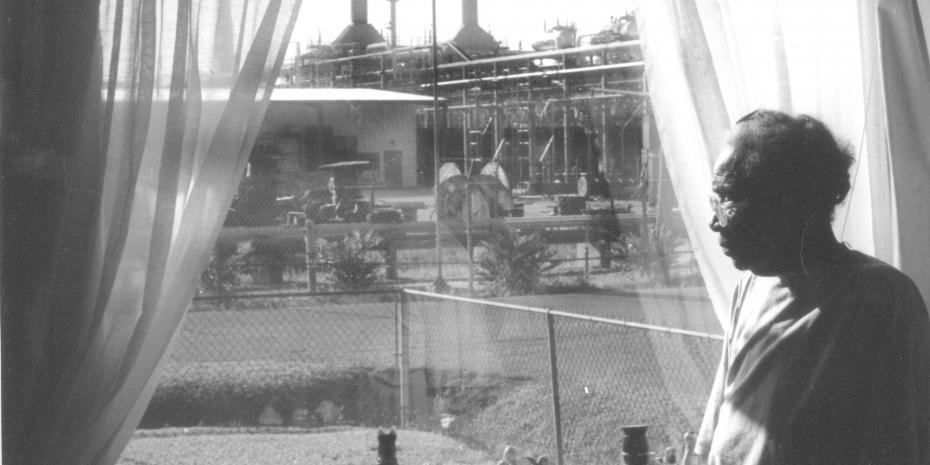I Expect More Violence from the Oil Industry

I began my career in West Africa in the 1990s, where Nigerians who peacefully protested the oil industry’s destruction of their farms were raped, beaten and murdered. In the Niger Delta, violent repression was the oil industry and the Nigerian government’s response to a movement that had grown so powerful that on one day, in one protest, there were 300,000 people in the streets.
Above: Clara Smith looks out at the Shell Refinery across the street from her home in Norco, Louisiana (Photo Credit - Thom Scott)
Now the Standing Rock Sioux of North Dakota have the power as they resist the Dakota Access Pipeline. But they also have the oil industry sponsored violence (watch the video here). And as the oil industry feels more pressure from the Standing Rock Sioux, the Native Americans who are standing with them and the Keep it in the Ground movement, there is the threat of even more violence.
I am seeing it here in Louisiana. Last month, before the violence broke out in North Dakota, we occupied the local2 headquarters of the Bureau of Ocean Energy Management to repeat our call for an end to new drilling in the Gulf of Mexico. I told the Associated Press and other reporters about the violent foreboding in our part of the world. The radio program Living on Earth was the only media outlet to include my concerns about industry sponsored violence. Here’s an excerpt from that interview.
“When we went to their [Bureau of Ocean Energy Management] office last week, who was there? Two armed guards. Something is really wrong when you have to arm people in order to pull natural resources out of the ground. We certainly see this in countries around the world in places like Nigeria where I worked for several years, but now it's come to Louisiana. And it's a new day. I think what's ahead is more of the same, but we will continue to defend our natural resources and our homes from an industry that really is a predator.”
Days later, security teams used dogs and pepper spray against the peaceful Standing Rock Sioux. Such violence, of course, is nothing new to indigenous communities who have been brutalized, cheated and murdered since Europeans arrived and stole their land. But now Big Oil has joined in, adding to the violence.
To any of us who have battled the oil industry, the violence against the Sioux is not surprising. The fossil fuel industry in general and the oil industry in particular has used any means necessary to extract its riches from the earth. This is true all over the globe, from the Americas and Africa to Asia and the Middle East.
In the refinery towns where I’ve worked for 17 years, the police and private security have consistently harassed me and those I work with. When we stop near a refinery and take a picture of a burning flame or black cloud of pollution, we know to snap fast. A police officer or oil industry security guard will pull up and tell us what we’re doing is illegal, even though it’s not.
The law may be on our side, but these security forces are not. It’s often not worth risking a dangerous encounter in a small southern town to stop and record pollution.
What we’re recording is another form of violence – this kind the long, steady attack of carcinogens and neurotoxins that ruin the health and the lives of those in Louisiana, usually African Americans, who are unfortunate enough to live cheek to cheek with Big Oil’s refineries.
The Sioux and their supporters did not run away but held their ground – even pursued bulldozers - in the face of the dog attacks and pepper spray from the security force. When questioned on camera, one member of the security force denied using pepper spray though he clearly had done so. He and his colleagues eventually got in their trucks and drove away. A Washington Post story reported that security guards and their dogs had been injured. This, too, is typical of Big Oil – claiming harm when they are the brutal, destructive instigator.
The media attention has no doubt slowed the violence in North Dakota. The security guards might have released their dogs in force were Amy Goodman not there with her Democracy Now film crew.
But I write this as a warning cry. After the cameras leave, the Standing Rock Sioux will be at even greater risk, for the burn of retribution runs hot - as hot as the oil industry’s sense of entitlement to our natural resources.
I write this as a warning cry, too, for the Deep South. As our movement to end new drilling in our Gulf of Mexico gains power, the oil industry will be out in force with their weapons and their violence. Please come when we call.
